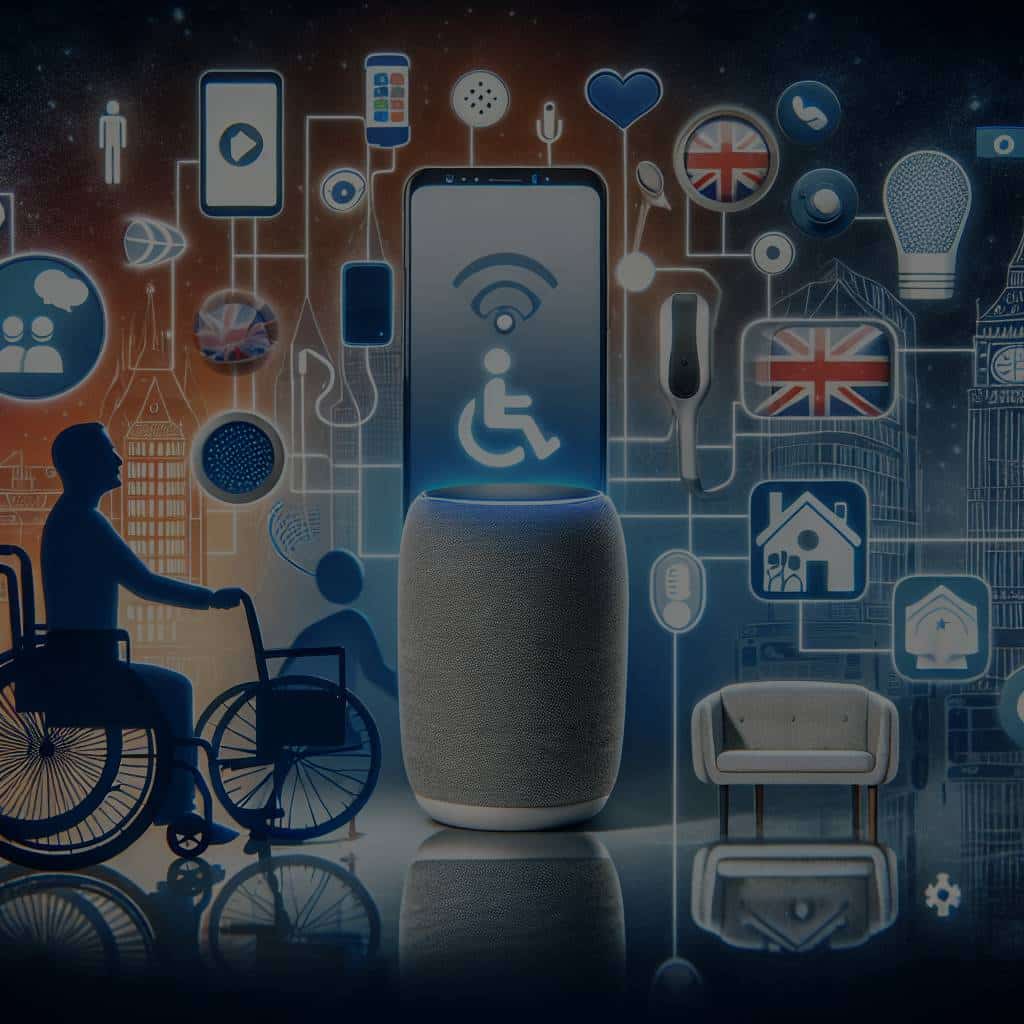How Can Smart Assistants Improve Accessibility for Disabled Individuals in the UK?

Imagine a world where your voice can assist you in accomplishing daily tasks, no matter your physical abilities or disabilities. We are indeed living in that world and with the advent of smart voice-controlled devices, this has become a reality. The combination of smart technology, voice recognition, and assistive tools are dramatically transforming the lives of people with disabilities in the UK. This article will delve into how smart voice-controlled devices assist in improving accessibility for disabled individuals in the UK. We’ll explore Google’s assistant, disability-supportive apps, and the potential of data and technology in enhancing the user experience.
Google Assistant: An Empowering Tool
Google’s intelligent personal assistant, known as Google Assistant, has been at the forefront of offering help to users, including those with disabilities. The design of Google Assistant is a product of cutting-edge technology and innovation, a testament to Google’s commitment to making a difference in people’s lives.
In parallel : Dive into the unexpected: the allure of mystery boxes
Google Assistant is built to understand your voice and carry out commands accordingly. These commands can range from simple tasks such as setting a reminder or making a call, to complex tasks like managing home appliances. For individuals with disabilities, the ability to control their devices with just their voice is empowering.
Moreover, Google Assistant can provide assistance in several languages, making it accessible to a broad spectrum of users. For the disabled, this opens up a world of opportunities, easing the struggle of geographical and linguistic barriers, and making the world an accessible playground.
Also read : Can Phytoremediation Techniques Clean Up UK’s Contaminated Industrial Sites?
Speech Recognition Technology: A Scholarly Exploration
The intricate design of smart voice-controlled devices relies heavily on speech recognition technology. It’s a subject that scholars have been exploring and refining for years to create a more inclusive world.
Speech recognition technology interprets human speech and converts it into commands that are understood by the device. This technology is a particular boon for individuals who might have difficulty using their hands to operate a device. From searching the web to composing emails, the possibilities are endless.
Moreover, the speech recognition technology has been evolving over time. It’s now capable of understanding complex commands and even discerning between different voices. This is incredibly useful, particularly for users with speech impairments, as the device can be trained to understand their unique speech patterns.
Assistive Apps: Bridging the Gap
While the technology itself is impressive, it’s the apps designed to work with these smart assistants that truly bridge the gap between people with disabilities and the digital world.
There are numerous apps developed specifically with disabled users in mind. For instance, apps that convert speech to text can be of great help to people who are hard of hearing. Similarly, apps that read out the text on the screen can assist visually impaired users.
In essence, these apps are making technology more accessible to all users, irrespective of their physical abilities. They are helping people with disabilities to be independent, stay connected, and live their lives more efficiently.
Data and Technology: Powering a Better User Experience
As with any technology, the user experience is key. In the realm of smart voice-controlled devices, data plays a pivotal role in driving a better user experience.
Smart assistants continuously learn from the user’s commands and preferences to provide a more personalized experience. They can remember your frequently visited places, preferred route, favourite music, and even your usual shopping list. This use of data to enhance the user experience is vital, especially for users with disabilities.
For instance, a smart assistant can be programmed to remember the specific voice commands of a person with a speech disorder. This ability of the device to learn and adapt to the user’s unique requirements makes it an indispensable tool for people with disabilities.
Control and Independence: The Ultimate Goals
The ultimate goal of these voice-controlled smart assistants is to allow users, particularly those with disabilities, to have greater control over their environment and their daily routine.
These devices are designed to perform a multitude of tasks, from controlling home appliances to managing schedules, thereby providing a level of independence to people with disabilities that wasn’t previously possible.
This newfound independence can transform the lives of people with disabilities, making them less dependent on others, and more importantly, demonstrating that technology can be a powerful enabler when appropriately tailored to the needs of the individual.
In conclusion, the application of smart voice-controlled devices represents a significant step forward in making technology more accessible to people with disabilities. By leveraging data and innovative design, these devices are helping users lead independent and fulfilling lives. The integration of such technology into everyday life holds great promise for the future of accessibility in the UK and beyond.
The Dawn of a Smarter Home: Teaming up with Virtual Assistants
An integral part of making life more accessible for individuals with disabilities is the development and integration of smart home technology. Powered by artificial intelligence, smart home devices are becoming increasingly prevalent in the UK, acting as game-changers for people with disabilities.
These smart homes, equipped with smart speakers and virtual assistants, can be controlled using simple voice commands. For disabled people who may have mobility impairments or difficulty operating traditional devices, this voice-controlled environment can significantly enhance their quality of life.
The major players in the smart speaker market such as Amazon Echo, Google Home, and Apple HomePod have all integrated their respective virtual assistants into their devices. These assistants, including Google Assistant, can be programmed to control various devices around the home, from turning on the lights to adjusting the thermostat. For people with disabilities, this convenience can make a world of difference, enabling them to perform everyday tasks with ease and confidence.
Moreover, artificial intelligence is continuously learning and adapting to the user’s preferences, making the experience even more personalised. For example, a virtual assistant can adapt to the unique speech patterns of a person with a brain injury, enabling the device to understand and execute their commands effectively.
Lastly, the advent of eye gaze technology is another significant advancement in this field. For individuals who have difficulty speaking or controlling their limbs, this technology allows them to interact with devices just by moving their eyes. This innovation exemplifies how the union of smart technology and artificial intelligence is continuously breaking down barriers for disabled individuals.
The Role of Research in Advancing Assistive Technology
The development and refinement of assistive technology have been greatly aided by the invaluable contributions of scholars and researchers. The proceedings of international conferences and scholarly papers available on Google Scholar provide crucial insights into the advancements in this field.
Researchers are constantly investigating how to make smart devices more accessible and adaptable for people with disabilities. For example, at the International Conference on Assistive Technology, discussions and sessions are often dedicated to exploring the potential of smart speakers and voice assistants in enhancing the lives of disabled individuals.
Furthermore, the role of data in refining these technologies cannot be overstated. By analysing data collected from smart devices, researchers can identify gaps in the technology’s accessibility and design solutions to address them. This data-driven approach is pivotal in the continued evolution of smart technology.
Conclusion: The Future of Accessibility is Smart
As we navigate the rapidly evolving landscape of technology, the overarching goal remains the same – to create an inclusive world where technology is accessible to all. The application of smart technology, specifically smart assistants, is a monumental stride in that direction.
With the amalgamation of artificial intelligence, smart speakers, and assistive devices, we are witnessing a profound shift in the way people with disabilities interact with the world around them. From Google Assistant facilitating multilingual interactions to intuitive apps bridging communication gaps – the potential of these technologies is immense.
Moreover, the commitment of scholars and researchers to further refine these technologies promises a future where disabled individuals can lead more independent and fulfilling lives. The integration of smart home devices represents a transformative moment in the ongoing quest for universal accessibility.
By continuing to leverage the power of data, artificial intelligence, and human ingenuity, we have the potential to make every voice heard, every command understood, and every home smarter and more accessible. The future of accessibility in the UK and beyond indeed looks promising, thanks to the revolution brought about by smart technology and voice-controlled assistants.
